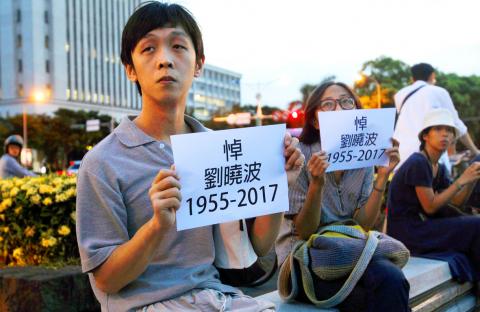A commemorative event was held in Taipei last night to mourn the passing of Chinese Nobel Peace Prize laureate Liu Xiaobo (劉曉波) as politicians stressed the importance of democracy and human rights.
Liu, sentenced to 11 years in jail in 2009 for “inciting subversion of state power” after he helped write a petition entitled Charter 08, which called for sweeping political reforms, died on Thursday after battling liver cancer. He was 61.
The commemoration, held in Liberty Square, was initiated by the New School for Democracy, an institution chaired by exiled Chinese democracy activist Wang Dan (王丹).

Photo: Chiang Ying-ying, AP
The group called for Beijing to release all those imprisoned for speaking out against the Chinese Communist Party.
Earlier, Kaohsiung Mayor Chen Chu (陳菊) said it was sad to hear of Liu’s passing, offering her condolences for Liu’s 28 years of house arrest and imprisonment, adding that “only those who have been in jail can understand.”
Chen herself served six years and two months in prison for her participation in the Formosa Incident, a pro-democracy demonstration organized by Formosa Magazine on Dec. 10, 1979.
“No one should be imprisoned for expressing a different view using any method,” she said. “Liu’s struggles and his adherence to his ideals reminds us that freedom and democracy do not fall out of the sky. Freedom and democracy cannot be retained without effort spent to safeguard it.”
Taipei Mayor Ko Wen-je (柯文哲) said that China is constantly criticized by other nations for being “barbaric” and that it should endeavor to improve its human rights record.
“Should China be willing, Taiwan is an excellent example of a success story and we hope that Chinese, one day, will enjoy freedom and democracy,” Ko said. “This is what [China] needs to work on.”
Former president Ma Ying-jeou (馬英九) wrote on Facebook that while the world mourned the passing of Liu, China should seek to improve its record on freedom and human rights, both to live up to its position as a “great power” and the “Chinese dream.”
Meanwhile, in response to President Tsai Ing-wen’s (蔡英文) remarks on Thursday that Taiwan hoped China could show self-confidence and promote political reform following the death of the Nobel laureate, Beijing yesterday accused Tsai of aggravating tension across the Taiwan Strait.
China’s Taiwan Affairs Office spokesman Ma Xiaoguang (馬曉光) was quoted by Xinhua news agency as saying that such “reckless” comments were “very dangerous” for cross-strait relations and were an example of Tsai’s “repeated arbitrary attacks.”
He said Tsai and the Democratic Progressive Party had “lifted the deceptive veil” of maintaining the “status quo” in cross-strait relations and that the repeated attacks were an attempt to regress ties to “tension and turbulence.”
“Such behavior is very dangerous,” he said, according to the Xinhua report, which was published only in English.
Additional reporting by Peng Wan-hsin and agencies

SECURITY: As China is ‘reshaping’ Hong Kong’s population, Taiwan must raise the eligibility threshold for applications from Hong Kongers, Chiu Chui-cheng said When Hong Kong and Macau citizens apply for residency in Taiwan, it would be under a new category that includes a “national security observation period,” Mainland Affairs Council (MAC) Minister Chiu Chui-cheng (邱垂正) said yesterday. President William Lai (賴清德) on March 13 announced 17 strategies to counter China’s aggression toward Taiwan, including incorporating national security considerations into the review process for residency applications from Hong Kong and Macau citizens. The situation in Hong Kong is constantly changing, Chiu said to media yesterday on the sidelines of the Taipei Technology Run hosted by the Taipei Neihu Technology Park Development Association. With

CARROT AND STICK: While unrelenting in its military threats, China attracted nearly 40,000 Taiwanese to over 400 business events last year Nearly 40,000 Taiwanese last year joined industry events in China, such as conferences and trade fairs, supported by the Chinese government, a study showed yesterday, as Beijing ramps up a charm offensive toward Taipei alongside military pressure. China has long taken a carrot-and-stick approach to Taiwan, threatening it with the prospect of military action while reaching out to those it believes are amenable to Beijing’s point of view. Taiwanese security officials are wary of what they see as Beijing’s influence campaigns to sway public opinion after Taipei and Beijing gradually resumed travel links halted by the COVID-19 pandemic, but the scale of

A US Marine Corps regiment equipped with Naval Strike Missiles (NSM) is set to participate in the upcoming Balikatan 25 exercise in the Luzon Strait, marking the system’s first-ever deployment in the Philippines. US and Philippine officials have separately confirmed that the Navy Marine Expeditionary Ship Interdiction System (NMESIS) — the mobile launch platform for the Naval Strike Missile — would take part in the joint exercise. The missiles are being deployed to “a strategic first island chain chokepoint” in the waters between Taiwan proper and the Philippines, US-based Naval News reported. “The Luzon Strait and Bashi Channel represent a critical access

Pope Francis is be laid to rest on Saturday after lying in state for three days in St Peter’s Basilica, where the faithful are expected to flock to pay their respects to history’s first Latin American pontiff. The cardinals met yesterday in the Vatican’s synod hall to chart the next steps before a conclave begins to choose Francis’ successor, as condolences poured in from around the world. According to current norms, the conclave must begin between May 5 and 10. The cardinals set the funeral for Saturday at 10am in St Peter’s Square, to be celebrated by the dean of the College